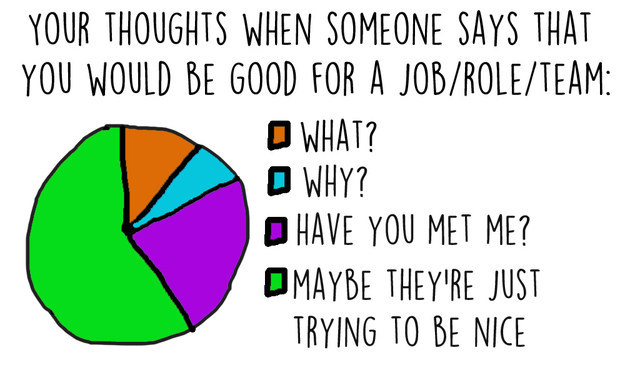People start businesses and nonprofits to make a difference, not to raise money, be a leader, or manage an organization.
Maybe this is you. Your dream is to change lives and solve problems.
Or maybe you didn’t start your nonprofit, but you may as well have because the passion and commitment to the cause is there.
Either way, you jump in with both feet then find out pretty fast that it’s harder than you thought.
Others make it look so easy to lead an organization, raise awareness, and champion a cause.
But for you, it’s not that simple.
 There’s a nagging sense that you don’t know what you’re doing. Doubt creeps in and clouds your ability to make decisions, keeping you stuck where you are instead of saying “yes” to lots of opportunities that could help you grow your nonprofit much faster.
There’s a nagging sense that you don’t know what you’re doing. Doubt creeps in and clouds your ability to make decisions, keeping you stuck where you are instead of saying “yes” to lots of opportunities that could help you grow your nonprofit much faster.
No matter what you do, you worry that at some point people will figure out that you don’t know what you’re doing and you’ll be exposed as the fraud you are.
This feeling is known as imposter syndrome and it’s very common among entrepreneurs and nonprofit Founders and leaders.
Let me show you how to identify what may be triggering feelings of imposter syndrome and how to overcome them.
What Imposter Syndrome is
According to Psychology Today, Imposter Syndrome is “a psychological phenomenon in which people are unable to internalize their accomplishments.”
It feels like anxiety, doubt, inadequacy, and unworthiness.
 You might have felt like an imposter only once or twice or you may have felt it frequently.
You might have felt like an imposter only once or twice or you may have felt it frequently.
It usually shows up when you step outside your comfort zone, trying something new.
The roles of Founder and Executive Director require you to do so much that you’re building new skills like mad and doing something new practically every day. And every single new experience is an opportunity to feel inadequate or worry that you’re not doing it right.
It’s easy to become worried that sooner or later everyone will see that you’re not the right person for the job (which isn’t true).
You might feel like a fraud if you:
- Have no real qualifications for running a nonprofit.
- Are intimidated by others, especially people who seem smarter than you.
- Believe that you’re missing education or credentials.
- Only succeeded so far due to luck.
We all experience Imposter Syndrome to one extent or another. Even after writing eleven books and winning several awards, Maya Angelou couldn’t escape the doubt that she hadn’t earned her accomplishments.
This feeling of fraudulence is extremely common and the crazy thing is that we all think we’re the only one who feels this way.
How Imposter Syndrome shows up day-to-day
So, what does Imposter Syndrome look like in practical terms?
It could be something like this:
Your fundraising event is successful and someone says to you “Great job on the event! It was so well done!” and all you can think is “I worked really hard and barely pulled it off. I don’t deserve praise.”
A highly-qualified person says “yes” to serving on your Board and you think “they just said “yes” out of sympathy.”
A donor gives a large amount of money and you think “they probably just want the tax write-off. We’re lucky they decided to give.”
You are asked to give an interview on TV and you think “they probably couldn’t find anyone else who would agree to be on the show.”
Most of us have a tendency to downplay our accomplishments, especially things that come easy to us. We think if it’s easy for us it must be easy for everyone. The truth is that things we’re really good at come easy and we haven’t learned to acknowledge ourselves or celebrate our accomplishments.
Unfortunately for most Founders and Executive Directors, fundraising may NOT be something you’re good at. Yet.
 So, to avoid the feelings of discomfort inherent in Imposter Syndrome:
So, to avoid the feelings of discomfort inherent in Imposter Syndrome:
- We stay in our comfort zone where it’s safe.
- We avoid anything that feels like a stretch.
- We don’t share our ideas to dodge potential criticism.
I get it. I didn’t always know how fundraising works.
Back when I started in fundraising, there were no degrees or courses you could take to learn new skills. It was all on-the-job training – sink or swim.
With a background in marketing, there were things I felt comfortable doing but a whole lot that I wasn’t comfortable with. Every time I needed to try something new, it was scary and I felt like a fraud. The first time I got face-to-face with a donor, I just knew she was going to figure out I didn’t know what I was doing and refuse to give any longer. Thankfully, that was not what happened!
It took several years before I believed in myself and the skills I had built, knowing that I could raise the money my nonprofit depended on.
Let me share a few things that worked for me (and still do!).
Simple steps to overcome Imposter Syndrome
There are lots of things you can do to overcome any Imposter Syndrome you might be feeling.
The Bottom Line
Just because someone looks successful doesn’t mean they are. And they probably didn’t get to where they are because they’re lucky or smart. People succeed because of commitment and persistence. They decide what they want then they go after it
You don’t have to be the most knowledgeable, the most educated, or the most experienced person for the job. You just have to care and be willing to do the work.
You are smarter than you think you are. You know more about running your nonprofit than anyone else. And you’re in exactly the right spot to make a difference.
You’re not an imposter. You’re a caring person who is changing lives.
Additional Resources
What is imposter syndrome? (Ted talk) https://www.ted.com/talks/elizabeth_cox_what_is_imposter_syndrome_and_how_can_you_combat_it?language=en#t-170017
Overcoming Imposter Syndrome (Advice from 12 successful entrepreneurs) https://www.insanegrowth.com/impostor-syndrome/?msID=969b3139-560d-4697-96dd-da4e36aa0f7e

 Stay focused on those you serve. This ALWAYS works for me. Typically, when I’m nervous about asking for money, I’m making it all about me. If I shift my thinking and focus on those my nonprofit serves, I put the focus where it needs to be – on the mission. This technique works for lots of people because it’s easier to ask on behalf of those who depend on our nonprofit rather than ask on behalf of ourselves which can feel selfish.
Stay focused on those you serve. This ALWAYS works for me. Typically, when I’m nervous about asking for money, I’m making it all about me. If I shift my thinking and focus on those my nonprofit serves, I put the focus where it needs to be – on the mission. This technique works for lots of people because it’s easier to ask on behalf of those who depend on our nonprofit rather than ask on behalf of ourselves which can feel selfish. Celebrate every time you hit a goal. No matter how large or small, celebrate every success. Most of the time, we work so fast that when we hit a goal, we acknowledge it for 2.3 seconds then move on to the next task. CELEBRATE when things go well! That means stop for a moment to say “Wow, I did it! That worked!” Notice how you feel about reaching the goal. Think about how reaching that one goal will help you reach your annual goals. Thank those involved in helping you reach your goal. If you journal, write a note about how you feel and why you’re grateful about reaching the goal.
Celebrate every time you hit a goal. No matter how large or small, celebrate every success. Most of the time, we work so fast that when we hit a goal, we acknowledge it for 2.3 seconds then move on to the next task. CELEBRATE when things go well! That means stop for a moment to say “Wow, I did it! That worked!” Notice how you feel about reaching the goal. Think about how reaching that one goal will help you reach your annual goals. Thank those involved in helping you reach your goal. If you journal, write a note about how you feel and why you’re grateful about reaching the goal.




Leave A Comment